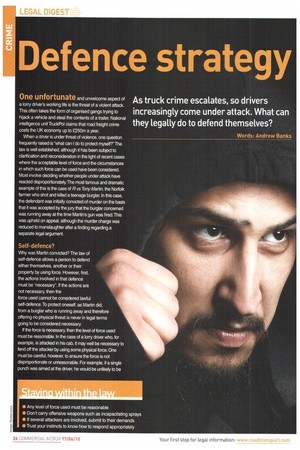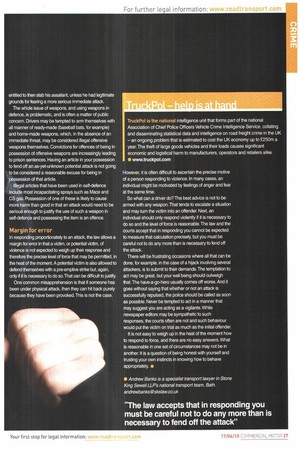As truck crime escalates, so drivers increasingly come under attack. What can they legally do to defend themselves?
Page 26

Page 27

If you've noticed an error in this article please click here to report it so we can fix it.
Words: Andrew Banks One unfortunate and unwelcome aspect of a lorry drivers working life is the threat of a violent attack. This often takes the form of organised gangs trying to hijack a vehicle and steal the contents of a trailer. National intelligence unit TruckPol claims that road freight crime costs the UK economy up to £250m a year.
When a driver is under threat of violence one question frequently raised is 'what can I do to protect myself? The law is well established, although it has been subject to clarification and reconsideration in the light of recent cases where the acceptable level of force and the circumstances in which such force can be used have been considered Most involve deciding whether people under attack have reacted disproportionately. The most famous and dramatic example of this is the case of R vs Tony Martin. the Norfolk farmer who shot and killed a teenage burglar. In this case the defendant was initially convicted of murder on the basis that it was accepted by the jury that the burglar concerned was running away at the time Martin's gun was fired This was upheld on appeal. although the murder charge was reduced to manslaughter after a finding regarding a separate legal argument Self-defence?
Why was Martin convicted? The law of self-defence allows a person to defend either themselves, another or their property by using force However, first.
the actions involved in that defence
must be 'necessaryIf the actions are
not necessary, then the force used cannot be considered lawful self-defence To protect oneself. as Martin did from a burglar who is running away and therefore offering no physical threat is never in legal terms going to be considered necessary.
If the force is necessary. then the level of force used must be reasonable In the case of a lorry driver who, for example, is attacked in his cab. it may well be necessary to fend off the attacker by using some physical force. One must be careful. however, to ensure the force is not disproportionate or unreasonable For example if a single punch was aimed at the driver, he would be unlikely to be • Any level of force used must be reasonable • Don't carry offensive weapons such as incapacitating sprays • If several attackers are involved, submit to their demands • Trust your instincts to know how to respond appropriately entitled to then stab his assailant, unless he had legitimate grounds for fearing a more serious immediate attack The whole issue of weapons, and using weapons in defence, is problematic, and is often a matter of public concern. Drivers may be tempted to arm themselves with all manner of ready-made (baseball bats, for example) and home-made weapons, which, in the absence of an immediate threat, may be considered illegal offensive weapons themselves. Convictions for offences of being in possession of offensive weapons are increasingly leading to prison sentences. Having an article in your possession to fend off an as-yet-unknown potential attack is not going to be considered a reasonable excuse for being in possession of that article.
Illegal articles that have been used in self-defence include most incapacitating sprays such as Mace and CS gas. Possession of one of these is likely to cause more harm than good in that an attack would need to be serious enough to justify the use of such a weapon in self-defence and possessing the item is an offence.
Margin for error
In responding proportionately to an attack, the law allows a margin for error in that a victim, or potential victim, of violence is not expected to weigh up their response and therefore the precise level of force that may be permitted, in the heat of the moment. A potential victim is also allowed to defend themselves with a pre-emptive strike but, again, only if it is necessary to do so. That can be difficult to justify.
One common misapprehension is that if someone has been under physical attack, then they can hit back purely because they have been provoked. This is not the case. However. it is often difficult to ascertain the precise motive of a person responding to violence In many cases. an individual might be motivated by feelings of anger and fear at the same time.
So what can a driver do? The best advice is not to be armed with any weapon. That tends to escalate a situation and may turn the victim into an offender. Next an individual should only respond violently if it is necessary to do so and the level of force is reasonable The law and the courts accept that in responding you cannot be expected to measure that calculation precisely. but you must be careful not to do any more than is necessary to fend off the attack.
There will be frustrating occasions where all that can be done, for example, in the case of a hijack involving several attackers. is to submit to their demands The temptation to act may be great. but your well being should outweigh that The have-a-go-hero usually comes off worse. And it goes without saying that whether or not an attack is successfully repulsed, the police should be called as soon as possible Never be tempted to act in a manner that may suggest you are acting as a vigilante While newspaper editors may be sympathetic to such responses. the courts often are not and such behaviour would put the victim on trial as much as the initial offender.
It is not easy to weigh up in the heat of the moment how to respond to force, and there are no easy answers What is reasonable in one set of circumstances may not be in another. It is a question of being honest with yourself and trusting your own instincts in knowing how to behave appropriately. mi
• Andrew Banks is a specialist transport lawyer in Stone King Sewell LLP's national transport team. Bath andrewbanks@skslaw co. uk
































































































































